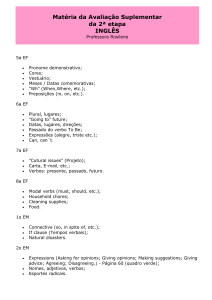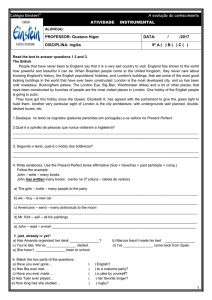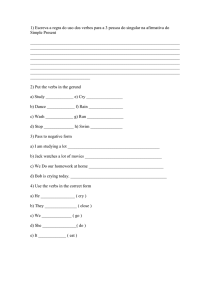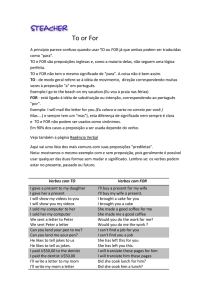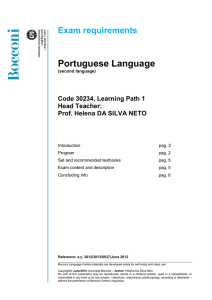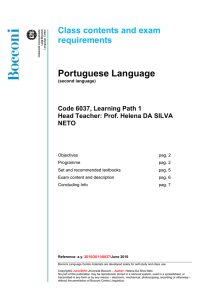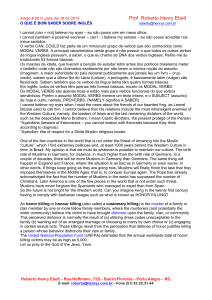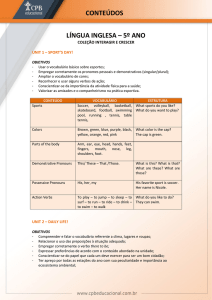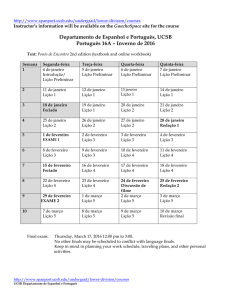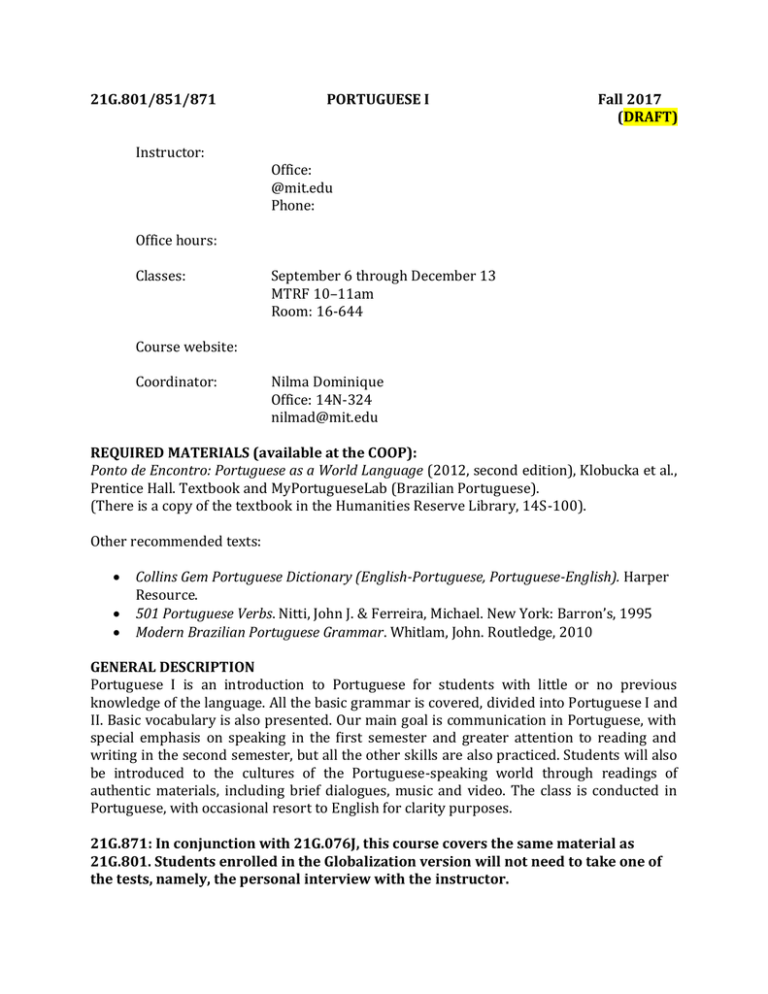
21G.801/851/871
PORTUGUESE I
Fall 2017
(DRAFT)
Instructor:
Office:
@mit.edu
Phone:
Office hours:
Classes:
September 6 through December 13
MTRF 10–11am
Room: 16-644
Course website:
Coordinator:
Nilma Dominique
Office: 14N-324
[email protected]
REQUIRED MATERIALS (available at the COOP):
Ponto de Encontro: Portuguese as a World Language (2012, second edition), Klobucka et al.,
Prentice Hall. Textbook and MyPortugueseLab (Brazilian Portuguese).
(There is a copy of the textbook in the Humanities Reserve Library, 14S-100).
Other recommended texts:
•
•
•
Collins Gem Portuguese Dictionary (English-Portuguese, Portuguese-English). Harper
Resource.
501 Portuguese Verbs. Nitti, John J. & Ferreira, Michael. New York: Barron’s, 1995
Modern Brazilian Portuguese Grammar. Whitlam, John. Routledge, 2010
GENERAL DESCRIPTION
Portuguese I is an introduction to Portuguese for students with little or no previous
knowledge of the language. All the basic grammar is covered, divided into Portuguese I and
II. Basic vocabulary is also presented. Our main goal is communication in Portuguese, with
special emphasis on speaking in the first semester and greater attention to reading and
writing in the second semester, but all the other skills are also practiced. Students will also
be introduced to the cultures of the Portuguese-speaking world through readings of
authentic materials, including brief dialogues, music and video. The class is conducted in
Portuguese, with occasional resort to English for clarity purposes.
21G.871: In conjunction with 21G.076J, this course covers the same material as
21G.801. Students enrolled in the Globalization version will not need to take one of
the tests, namely, the personal interview with the instructor.
Class size is limited to 18 students for pedagogical purposes. Level I-II – Preference is given
to pre-registered students. Continuing students get first priority, followed, in order, by
declared concentrators, students in 21G.076, sophomores, juniors, freshmen, seniors,
graduate students, pre-registered students who did not show up for the first two days of
class without warning.
Additional resources, as well as the complete course syllabus, can be found at the Stellar
site. You will need an MIT certificate to access it.
EVALUATION / GRADES
Grading is based on frequent small evaluations rather than on one or two major hurdles:
1. Class attendance and participation (20%)
Your presence and active participation are essential in each and every session. This
will be the most significant part of your grade since it is through continuous class
interaction with other students that your communicative abilities in Portuguese will
develop and improve. Your grade will be determined daily by the quality and
quantity of your preparation and participation in class discussions, activities, group
work, etc.
Attendance: As your progress, and that of the class as a whole, will be impeded by
excessive absences, your presence in the classroom is imperative. If you must miss a
class, there is no excuse for not being prepared for the next one. If you must be
absent, please contact the instructor in advance to find out what material you will
miss. Each absence without an official excuse will lower your course attendance and
participation grade. Any student who has accumulated more than three absences
without an official excuse must see the instructor. Further absences after the
warning will affect your final grade.
2. Homework and written work (20%) Students will be expected to prepare the assigned materials for each class and
complete the written work as stipulated in the syllabus. These assignments include:
• Studying the vocabulary and grammar in the Ponto de Encontro textbook and
completing any written exercises assigned.
• Completing the exercises in MyPortugueseLab. The answers to most exercises are
provided immediately. Exercises requiring long written responses will be corrected
by the instructor.
• All assignments are to be completed according to the calendar. Late work will not
receive full credit. Anything marked “enviar” is to be submitted online. The exercises
in MyPortugueseLab are designed to reinforce the grammar and vocabulary
introduced in the textbook, as well as to improve your listening comprehension.
They are required components of the course and it is important that you complete
them right away, soon after the material is covered. Do not let your work pile up.
2
Working a little every day and reviewing frequently are more effective than a few
long sessions of study at longer intervals.
3. Exams (40%)
There will be four in-class tests.
4. Oral presentation (20%)
In addition to the written exams, students will make a ten-minute oral presentation
in Portuguese in front of the class. Students may talk about a place where
Portuguese is spoken or a historically or culturally significant figure in the
Lusophone world. Alternatively, they may choose to talk about a personal trip.
There will also be an individual speaking assessment in the form of a five-minute
interview (entrevista) with the instructor.
Grading Scale:
A+ (98 - 100)
A (94 - 97.9)
A- (90 - 93.9)
B+ (86 - 89.9)
B (84 - 85.9)
B- (80 - 83.9)
C+ (76 - 79.9)
C (74 - 75.9)
C- (70 - 73.9)
D+ (66-69.9)
D (63-65.9)
F (62 and below)
ACADEMIC INTEGRITY
Academic integrity is defined by the Center of Academic Integrity as “a commitment, even
in the face of adversity, to five fundamental values: honesty, trust, fairness, respect, and
responsibility.” If you have not done so yet, please read the MIT Academic Integrity
Handbook at http://integrity.mit.edu.
Learning a foreign language is not something that typically occurs in isolation.
Communication and practice are essential; therefore, working with others is highly
encouraged. However, there are cases in which collaboration is tantamount to cheating.
Having your pronunciation corrected by a native speaker before an oral presentation, for
example, is perfectly acceptable, as they will not be uttering the words for you in class.
Using a spellchecker is valid if you are writing a text, but having a text edited by another
person before submission is clearly a different matter. In this example, the editor is, to
some extent, the coauthor of the text. Likewise, the use of dictionaries is recommended, but
not translation program may be used. In summary, obtaining help from people or online
resources is allowed as a way of enhancing your learning, but should be avoided altogether
if, as a result of it, the work submitted does not accurately represent the student’s progress
or capacity. In such case, this would be considered academic dishonesty.
If you have any questions regarding this matter, consult with your instructor.
CELL PHONE, TEXT MESSAGING AND LAPTOP POLICY
No cell phones or other electronic communication devices are to be used during class. You
may use your laptop in case a class activity requires use of the textbook and you have the
digital version of the textbook and not a hard copy.
*****************************************************************************************
3
PORTUGUÊS I (21G.801)
Fall 2016
Always read “Vamos viajar” and “Horizontes” in the order they appear in each lesson. Be
prepared to discuss them in class.
Explore MyPortugueseLab, where you will find videos, audios, flash cards, etc. It is highly
advisable to read “Readiness Check” before each new grammar point.
SETEMBRO
Quinta-feira, 7 (LP, pp. 2-7)1
Apresentação do curso
O mundo de língua portuguesa
Apresentações e saudações
______________________________________________________________________
Sexta-feira, 8 (LP, pp. 9-10)
Expressões de cortesia
Expressões úteis na sala de aula (pp. 24-25)
O alfabeto
______________________________________________________________________
Segunda-feira, 11
Letras e sons: a fonética do português
Vogais abertas, fechadas e nasais
LER (read in MyPortugueseLab): SAM OP Pronúncia: Sílabas tônicas e acentos / As vogais /
As vogais nasais / Os sons do “d” e do “t”
______________________________________________________________________
Terça-feira, 12 (LP, pp. 11-12)
Identificação e descrição de pessoas
Cognatos
Verbo “ser” / Pronomes pessoais
______________________________________________________________________
Quinta-feira, 14 (LP, pp. 13-15)
Vocabulário: a sala de aula
Verbo “estar”
Preposições
______________________________________________________________________
In Portuguese, the days of the week are: segunda-feira (Monday), terça-feira (Tuesday),
quarta-feira (Wednesday), quinta-feira (Thursday), sexta-feira (Friday), sábado (Saturday)
and domingo (Sunday).
1
4
Sexta-feira, 15 (LP, pp. 16-17)
Números de 0 a 99
Vocabulário: meses do ano e dias da semana
Enviar os exercícios da Lição Preliminar:
SAM OP-01, 03, 04, 05, 06, 08, 09, 12,13,15, 16, 18, 120, 21, 22, 23
______________________________________________________________________
Segunda-feira, 18 (L1, pp. 18-34)
As horas
Vocabulário: a vida dos estudantes
Verbos da primeira conjugação (-ar)
______________________________________________________________________
Terça-feira, 19 (L1, pp. 35-42)
Vocabulário: na universidade
Revisão pronomes pessoais e verbos em –ar
Vamos viajar: a vida universitária
______________________________________________________________________
Quinta-feira, 21 (L1, pp. 43-48)
Artigos e substantivos: gênero e número
Contração de preposições com artigos
LER (read in MyPortugueseLab): SAM 01 Pronúncia: Os ditongos orais / O “m” e o “n”
nasalizados ou nasalados / Os ditongos nasais
______________________________________________________________________
Sexta-feira, 22 (L1, p. 49)
Nacionalidades
Presente do verbo “estar”
______________________________________________________________________
Segunda-feira, 25 (L1, pp. 50-54)
Pronomes interrogativos
Vamos viajar: as universidades
______________________________________________________________________
Terça-feira, 26 (L1, p. 55; L2, p. 72)
Verbos regulares de segunda (-er) e terceira (-ir) conjugações
Horizontes: São Paulo e Rio de Janeiro
Cores
Enviar os exercícios da Lição 1:
SAM 01-01, 03, 04, 05, 06, 07, 08, 09, 10, 11, 12, 13, 14, 15, 16, 18, 19, 22, 23, 24, 25
5
______________________________________________________________________
Quinta-feira, 28
Produção oral e/ou escrita
______________________________________________________________________
Sexta-feira, 29
FERIADO: STUDENT HOLIDAY
______________________________________________________________________
OUTUBRO
Segunda-feira, 2
Teste 1: Lições Preliminar e 1
______________________________________________________________________
Terça-feira, 3 (L2, pp. 70-80)
Adjetivos descritivos
Plural dos adjetivos (revisão)
______________________________________________________________________
Quinta-feira, 5 (L2, pp. 81-89)
Vamos viajar: A diversidade global do mundo lusófono
Diferença entre “ser” e “estar”
Vamos viajar: Um mosaico étnico e racial
LER (read in MyPortugueseLab): SAM 02 Pronúncia: Inserção do som do “i” / Os sons do “i”
/ Os sons do “r” / Os sons do “m”, do “n” e do “nh”
______________________________________________________________________
Sexta-feira, 6 (L2, pp. 90-94)
Pronomes possessivos
Expressões com “ter” e “estar com”
______________________________________________________________________
Segunda-feira, 9 e terça-feira, 10 - FERIADO: COLUMBUS DAY
______________________________________________________________________
Quinta-feira, 12 (L2, pp. 95-102)
Cultura: Carmen Miranda e Amália Rodrigues
Produção oral e/ou escrita
______________________________________________________________________
Sexta-feira, 13 (L2, p. 104-105; L3, p. 113)
Horizontes: O sudeste e o sul do Brasil
Diversões populares
Enviar os exercícios da Lição 2
SAM 02-01, 02, 03, 04, 05, 06, 07, 09, 10, 13, 14, 15, 16, 18, 19
6
______________________________________________________________________
Segunda-feira, 16 (L3, pp. 114-118)
Vocabulário: comida
______________________________________________________________________
Terça-feira, 17 (L3, pp. 119-123)
Verbos regulares de segunda (-er) e terceira (-ir) conjugações
Vamos viajar: O cinema e o teatro
LER (read in MyPortugueseLab): SAM 03 Pronúncia: Os sons do “x” / Os sons do “g”
______________________________________________________________________
Quinta-feira, 19 (L3, pp. 124-134)
Verbos “ir” e “ter”, “ter que” + infinitive
Vamos viajar: A música e os concertos
Números acima de 100
Enviar os exercícios da Lição 3
SAM 03-01, 03, 04, 05, 07, 09, 11, 12, 13, 14, 15, 16, 17, 18, 19, 20, 21, 22
______________________________________________________________________
Sexta-feira, 20 (L3, pp. 136-149)
Usos de “por” e “para”
Horizontes: O Nordeste do Brasil
Produção oral e escrita
LER (read in MyPortugueseLab): SAM 04 Pronúncia: Os sons do “s” e do “z” / Ligação de
palavras (linking) / Ligação de palavras e crase
______________________________________________________________________
Segunda-feira, 23
Teste 2: Lições 2 e 3
______________________________________________________________________
Terça-feira, 24 (L4, pp. 150-156)
Vocabulário: a família
Atividade oral e/ou escrita
______________________________________________________________________
Quinta-feira, 26 (L4, pp. 157-162)
Verbos com mudança de raiz
Vamos viajar: Laços de família
______________________________________________________________________
Sexta-feira, 27 (L4, pp. 163-171)
7
Advérbios
Presente de verbos irregulares
“Fazer” (Faz) e “haver” (Há) com expressões de tempo
______________________________________________________________________
Segunda-feira, 30 (L4, pp. 172-174)
Vamos viajar: A família e a sociedade
Pretérito perfeito de verbos regulares e do verbo “ir”
Enviar os exercícios da Lição 4
SAM 04-01, 02, 03, 05, 06, 07, 08, 09, 10, 12, 14, 16
______________________________________________________________________
Terça-feira, 31 (L4, pp. 183-185)
Produção oral e escrita
Horizontes: O Norte do Brasil e o Amazonas
LER (read in MyPortugueseLab): SAM 05 Pronúncia: O acento: palavras proparoxítonas /
Os sons do “c” e do “ç” / O som do “q”
______________________________________________________________________
NOVEMBRO
Quinta-feira, 2 (L5, pp. 188-196)
Vocabulário: A casa e os móveis
As tarefas domésticas
______________________________________________________________________
Sexta-feira, 3 (L5, pp. 197-205)
Presente progressivo
Vamos viajar: Lugares para morar
“Ter”, “estar com” e “ficar com”
______________________________________________________________________
Segunda-feira, 6 (L5, pp. 206-217)
Pronomes adjetivos e demonstrativos
Presente de “dar”, “ler”, “ver”, “vir”, “saber”, “conhecer”
Vamos viajar: O exterior e o interior das casas
______________________________________________________________________
Terça-feira, 7 (L5, pp. 218-229)
Verbos e pronomes reflexivos
Produção oral e escrita
Horizontes: Brasília e o Centro-oeste
Enviar os exercícios da Lição 5
SAM 05-01, 02, 03, 04, 05, 06, 07, 08, 09, 10, 11, 14, 15, 17, 18, 19, 20, 21, 22, 23
8
______________________________________________________________________
Quinta-feira, 9
Teste 3: Lições 4 e 5
______________________________________________________________________
Sexta-feira, 10 - FERIADO: VETERANS’ DAY
______________________________________________________________________
Segunda-feira, 13 (L6, pp. 232-240)
Vocabulário: roupa e acessórios
LER (read in MyPortugueseLab): SAM 06 Pronúncia: O acento: palavras paroxítonas / Mais
sobre palavras paroxítonas
______________________________________________________________________
Terça-feira, 14 (L6, pp. 241-246)
Pretérito perfeito: verbos regulares e irregulares
Vamos viajar: As compras
______________________________________________________________________
Quinta-feira, 16 (L6, pp. 247-251)
Pronome objeto direto
Vamos viajar: Feiras e mercados
______________________________________________________________________
Sexta-feira, 17 (L6, pp. 252-263)
“Tag questions”
“Por” e “para”
Horizontes: Lisboa, a capital de Portugal
Enviar os exercícios da Lição 6
SAM 06-01, 03, 04, 05, 07, 10, 11, 12, 13, 14, 15, 16, 17, 18
____________________________________________________________________
Segunda-feira, 20 (L7, pp. 266-276)
Vocabulário: esportes, o tempo e as estações
LER (read in MyPortugueseLab): SAM 07 Pronúncia: O acento gráfico: hiato (hiatus) / O
acento grave e a crase
______________________________________________________________________
Terça-feira, 21 (L7, pp. 277-280)
Pronome objeto indireto
______________________________________________________________________
Quinta-feira, 23 e sexta-feira, 24 – Feriado: Ação de Graças
9
_____________________________________________________________________
Segunda-feira, 27 (L7, pp. 281-285)
Pretérito perfeito irregular
Vamos viajar: Os clubes esportivos
______________________________________________________________________
Terça-feira, 28 (L7, pp. 286-288)
Pretérito imperfeito
Vamos viajar: A história do futebol
______________________________________________________________________
Quinta-feira, 30 (L7, pp. 289-295)
Pretérito perfeito vs. pretérito imperfeito
Há / Faz (“ago”)
______________________________________________________________________
Sexta-feira, 1 (L7, pp. 302-303)
Horizontes: O Sul de Portugal
Atividade oral e / ou escrita ou apresentação oral
Enviar os exercícios da Lição 7
SAM 07-01, 02, 03, 04, 05, 06, 07, 09, 10, 11, 12, 13, 14, 15
______________________________________________________________________
DEZEMBRO
Segunda-feira, 4
Atividades de revisão
______________________________________________________________________
Terça-feira, 5
Produção oral e/ou escrita
______________________________________________________________________
Quinta-feira, 7
Apresentações orais
______________________________________________________________________
Sexta-feira, 8
Teste 4: Lições 6 e 7
______________________________________________________________________
Segunda-feira, 11
10
Apresentações orais
______________________________________________________________________
Terça-feira, 12
Entrevistas individuais
BOAS FÉRIAS ! ! !
11

